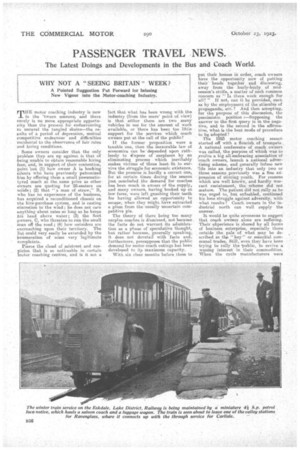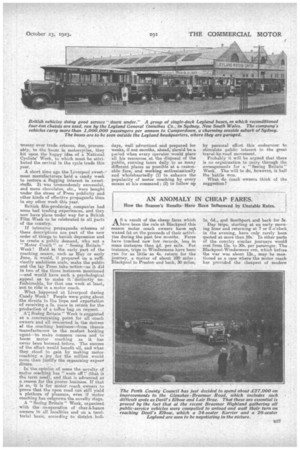PASSENGER TRAVEL NEWS.
Page 18

Page 19

If you've noticed an error in this article please click here to report it so we can fix it.
The Latest Doings and Developments in the Bus and Coach World.
WHY NOT A "SEEING BRITAIN" WEEK?
A Pointed Suggestion Put Forward for Infusing New Vigour into the Motor-coaching Industry.
THE motor coaching industry is now in the ''tween, soasonst, and there surely is no more appropriate opportunity than the present for endeavouring ro unravel the tangled skeins—the results of a period of depression, mutual competitive endeavour and difficulties incidental to the observance of fair rates and hiring conditions.
,Some owners consider that the only problem they are up against. is that of ,Oeing unable to obtain 'reasonable hiring fees, and, in support. of their contention, point *out (I) how owner A is booking clients' who have previously patronized him by offering them a small pneumatictyred coach at the., same price as other owners are quoting for 28-seaters on solids; (2) that "a man of straw," B, who has no experience of the business, has acquired a reconditioned chassis on the hire-purchase system and is casting discretion to the wind; he does not care anything about rates so long as he keeps his head above water; (3) the fleet owners, C, who threaten to run the small man of the road ; (4) how outsiders are encroaching upon their territory. The ist could very easily be extended by the !enumeration of some very 'legitimate complaints.
Pierce the cloud of .mistrust and suspicion that is so noticeable in -certain inotor coaching centres, and is it not a
fact that what has been wrong with the industry (from the users' point of view) is that either there are two many vehicles in use for the amount of work available, or there has been too little support for the services which coach owners put at the call of the public?
If the former proposition were a tenable one, then the inexorable law of economics can he depended upon ruthlessly to dispose of surpluses by an eliminating process which inevitably makes victims of those least fit to survive the struggle for economic existence. But the premise is hardly a correct one, for at certain times during the season just concluded the demand for coaches has been much in excess of the supply, and many owners, having booked up at low fares, were left gnashing their teeth for having allowed an opportunity to escape, when they might have extracted a plum from the usually uncertain competitive pie.
The theory of there being too many surplus coaches is dismissed, not because the facts do not warrant its adurribration as a phase of speculative thought, but rather because, generally speaking, it does not dovetail with facts and, furthermore, presupposes that the public demand for motor.coach outings has been developed to its maximum capacity.
With six clear months before them to put their houses in order, coach owners have the opportunity now of putting their' heads together and discussing, away from the hurly-burly of midseason's strife, a matter of such common concern as '" Is there work enough for all? " If not, can it be provided, such as by the employment Of the stimuhis of propaganda, etc.? And then accepting, for the purpose of this discussion, the pessimistic position :—Supposing the answer to the first query is in the negative, and to the second in the affirmative, what is the best mode of procedure to b adopted ?
The 1923 motor coaching season started off with a flourish of trumpets. A national conference of coach owners was called, the purpose of which was to evolve a big all-embracing association of -coach owners, launch a national advertising scheme and generally infuse new 'life into an industry that only two or three seasons• previously was a fine eXpression of stirring youth. For reasons which are well known, and hardly warrant restatement, the scheme did not mature. The patient did not rally as he was urged to, but enfeebled, continued his lone struggle against adversity, with what results Coach. owners in the industrial north can well supply the answer.
It would be quite erroneous to suggest that co,ch owrrers alone are suffering. Their experience is shared by all forms of business enterprise, especially those outside the pale of what may be described as the " key" or esiential communal trades. Still, even they have been trying to rally the 'public, to revive a waning interest in their commodities. When the cycle manufacturers were uneasy over trade returns, due, presumably, to the boorn in motorcycles, they hit upon the happy idea of a National Cyclists' Week, to which must be attributed the revival in the cycle trade this year.
A short time ago the Liverpool sweetmeat manufacturers held a candy week to restore a flagging interest in sweetstuffs. It was tremendonsly successful, and more chocolates, etc., were bought -under the stress of Press publicity and other kinds of effective propaganda than in any other week this year.
British film-producing companies had some bad trading experiences, and they now have plans under way for a, British Film Week to be celebrated in all parts of the country.
If intensive propaganda schemes of these descriptions are part of the new order of things to banish depression and to create a public demand, why not a " Motor Coach" or "Seeing Britain" Week? Held in the early part of the coaching season, such as May or early June, it would, if prepared on a sufficiently ambitious scale, make the public and the lay Press take notice—as it did in two of the three instances mentioned —and would have such a psychological appeal as to make it 'distinctly nn fashionable, for that one week at least, riot, to i . ride n a motor coach.
What happened at Liverpool during Candy Week? People were going about the streets in the hope and expectation of receiving a 5s. piece in return for the production of a toffee bag on request.
A': Seeing Britain" Week is suggested as a concentrating point for all -coach owners and all concerned in the success of the coaching business—from chassis manufacturers to the modest booking agent—to make common cause and to boom motor coaching as it has never been boomed before. The success of the effort would benefit all, and what
• they stood to gain by making motor coaching a joy for the million ,would more than justify the organizing expent diture.
In the opinion of some the novelty of motor coaching has "worn off (that is the term used), and that is advanced as a reason for the poorer business. If that is so, it is for motor coach owners to prove that the open road can still yield a plethora of pleasure' even if motor coaching has outgrown the novelty stage.
A "Seeing Britain" Week, organized with the cooperation of char-l-basses owners in all localities and on a territorial basis, according to district.
holi days, well advertised and prepared for weeks, if not months, ahead, should be a period when every operator would place all his resources, at the disposal of the public, running tours daily to as many different places as possible at a reaSonable fare, and working enthusiastically and wholeheartedly (1) to enhance the popularity of motor coaching by every means at his command; (2) to follow up by personal effort this endeavour to stimulate public interest in the great travel-by-road movement.
Probably it will be argued that there is no organization to carry through the arrangements for a "Seeing Britain" Week. The will to do, however, is half the 'battle won.
What, do coach owners think of the suggestion?






























